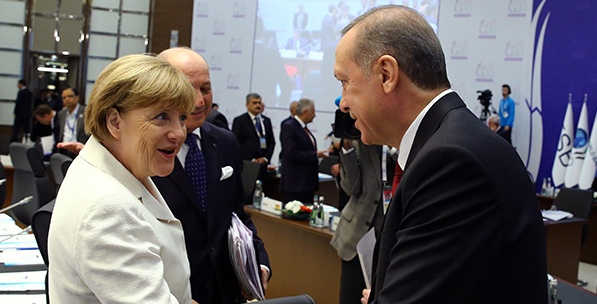The G20 summit took place in Antalya on Nov. 15-16 with an intense agenda during Turkey's tenure as president. The leaders of the world's 20 strongest economies came together to share ideas on topics ranging from economy to security, health to employment and environmental problems to global management.
Although the G20 is not an international institution with sanctioning and enforcement capabilities, it is nonetheless important as an international platform that can influence political, social, cultural and economic processes in a time of searching for a new world order and clarifying conflict points. It is obvious that the G20 is not an organization that has a settled legal foundation with the authority to arrange the international arena like the U.N. The U.N. was formed in a period when the nation-state was the main subject of international relations and was initiated in order to rid the world of wars, Europe foremost among them. The G20 platform, in its stead, is an organization that belongs to a period when it is shaped not just around nation-states, but also through capital, information industries and civil society organizations.
The depression in the world system experienced in the aftermath of the 1990s had a great influence in the formation of the G20. The unipolar world myth, appearing in the beginning of the 1990s, had rapidly dissolved, but had not been replaced by a new order that could design the international arena. While the U.S. emerged as the rising power of the international arena after the 1990s, it was not able to transform this power into international hegemony. The U.S.'s attempts to create international hegemony by using military power in the aftermath of the 9/11 attacks have also been unsuccessful. The U.S.'s invasion of Iraq in 2003 caused the start of a new period in the Middle East. Attacking Iraq and Afghanistan without searching for any international legitimation, the U.S. activated the big fault lines of the Middle East and served in the creation of the Middle East spectacle we are faced with today.
Experiencing serious turbulence with the appearance of the new political and social wave known as the Arab Spring in 2010 and the attempt to stifle this wave through repressive tactics, the Middle East has come center stage in the search for a new world order. Undoubtedly, the most important phenomenon of this period has been the Syrian crisis. Beginning in March 2011, the Syrian crisis quickly turned into a civil war and, also just as quickly, stopped being a regional problem and became a global one. Three reasons were effective in the appearance of this situation. The first is that Syria became an area wherein not just regional actors, but global actors also began a power struggle. Secondly, the Syrian refugee problem became a challenge affecting not only regional countries, but European countries as well. And third, terror organizations such as DAESH came to the fore, threatening international order and peace.
The G20 meeting occurred at a time when the Syrian crisis's effects are deeply felt. For this reason, the general expectation prior to the meeting was that the Syrian crisis's refugees, the struggle for international hegemony and terrorism would be the topics of the day. As a matter of fact, President Recep Tayyip Erdoğan, who presided over the summit, said at various times that the Syrian crisis would be examined at the G20 meetings. One of the most important problems in the context of the Syrian crisis was how the threat created by Syrian President Bashar Assad's regime would be removed and how the process of removing Assad from power would be managed. In this process, Turkey, France and Saudi Arabia's general attitude was that Assad be removed from power immediately. However, the upsetting attacks in Paris a day before the summit caused a change in France's priorities. In a contradictory manner, DAESH caused France's primary objective to change after the Paris massacres and made itself a target.
The G20 summit beginning in the shadow of the Paris attacks weakened criticism of the Assad regime. In its stead, the DAESH threat was placed on the agenda in a far clearer manner.
It is important to note that while speaking about international security risks, the G20 summit also included more examination of the socio-economic factors behind terror as compared to previous international summits. The division of resources and the elimination of inequalities in access came forward as important themes. In this sense, a new approach was created to the issue of sustainable development. That the meeting was held in a successful manner in Turkey with Erdoğan as host also was an important gain in terms of challenging the negative images that have been attempted to be created of Turkey.
[Daily Sabah, November 17, 2015]









